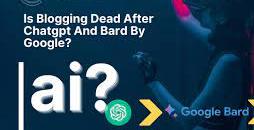However, with the advent of new AI-based content creation tools such as ChatGPT and Bard by Google, many people are wondering if blogging is still relevant.
In this article, we will explore whether blogging is dead after ChatGPT and Bard by Google and what the future holds for content creation.
Is Blogging Dead After Chatgpt And Bard By Google?
No,
blogging is not dead after ChatGPT and BERT by Google. These AI tools
are designed to improve search engine results by understanding the
context of user queries and delivering more relevant content.
While
ChatGPT and BERT can improve the quality of search results, they do not
replace the need for high-quality content. Bloggers who focus on
creating engaging, informative, and high-quality content will continue
to be successful in the future.
What is ChatGPT?
ChatGPT
is an AI-based language model created by OpenAI. It is one of the
largest language models available, with over 175 billion parameters.
ChatGPT can generate human-like text and complete tasks such as
translation, summarization, and question-answering.
What is Bard by Google?
Bard
is another AI-based language model developed by Google. It is designed
specifically for poetry generation and can create poems that are
difficult to distinguish from those written by humans. Bard is trained
on a diverse range of poetic styles and can even generate original
poetry based on a given topic or prompt.
The impact of ChatGPT and Bard on blogging
The
emergence of AI-based content creation tools such as ChatGPT and Bard
has undoubtedly had an impact on blogging. These tools can generate
high-quality, human-like content quickly and efficiently, which can make
it tempting to use them for content creation instead of traditional
blogging. However, the impact of these tools on blogging is not
straightforward.
On
the one hand, AI-based content creation tools can help bloggers save
time and effort, especially when it comes to generating content ideas or
creating SEO-friendly content. They can also help businesses scale
their content marketing efforts by generating a large amount of content
quickly and efficiently.
On
the other hand, AI-generated content lacks the personal touch and
creativity that human-written content can provide. AI-generated content
can be formulaic, lack nuance, and fail to capture the unique voice and
style of a particular brand or blogger. Additionally, there is a risk of
plagiarism and ethical concerns when using AI-generated content without
proper attribution or review.
How can bloggers stay relevant in the age of AI?
To
stay relevant in the age of AI, bloggers need to focus on creating
high-quality content that is unique, engaging, and informative. They
should try to bring their own perspective and experiences to their
writing, and avoid using automated tools to generate content.
Bloggers
can also use AI-based tools to optimize their content for search
engines and social media platforms. They can use tools like Google
Analytics to track their website traffic and identify the keywords and
phrases most relevant to their audience. They can also use tools like
Hootsuite or Buffer to automate their social media posts and increase
their visibility online.
Is there still a demand for human-written content?
Yes,
there is still a demand for human-written content. While AI-based tools
like ChatGPT and BERT can generate text that is grammatically correct
and coherent, they lack the creativity, originality, and nuance that
human writers bring to their work.
Readers still prefer content that is written by humans and can connect with them emotionally and intellectually.
Moreover,
human-written content is still necessary for creating engaging and
informative narratives that inspire and inform readers. AI-based tools
cannot create content that is entirely free from biases, errors, or
inconsistencies.
Human writers bring a unique perspective and style to their work that cannot be replicated by machines.
The importance of SEO in content creation
SEO
is an important factor to consider in content creation, whether using
AI-generated content or human-written content. Search engines use
complex algorithms to determine the relevance and authority of content,
making it important to optimize content for search.
This includes using relevant keywords, optimizing meta tags, and creating high-quality, engaging content.
While
AI-generated content can help to generate SEO-friendly content quickly
and efficiently, it lacks the personal touch and creativity that
human-written content provides.
By
focusing on SEO best practices and creating high-quality, engaging
content, bloggers and content creators can improve their search rankings
and reach a larger audience.
The future of content creation
The
future of content creation is likely to involve a combination of
AI-generated content and human-written content. AI-based content
creation tools will continue to improve, providing more advanced and
sophisticated features that can help bloggers and content creators save
time and effort.
However,
human-written content will remain an important part of content
creation, providing a unique perspective and personal touch that cannot
be replicated by AI.
By
combining the strengths of both AI-generated content and human-written
content, bloggers and content creators can create high-quality, engaging
content that resonates with their audience and drives results.
Conclusion
In
conclusion, blogging is not dead after ChatGPT and Bard by Google.
While AI-based content creation tools have their benefits, they cannot
replace the unique value that human-written content provides.
Blogging
remains an important part of any content marketing strategy, providing a
platform for businesses and individuals to connect with their audience
and build their brand.
Today
in this article we have talked that Is Blogging Dead After Chatgpt And
Bard By Google? How did you like the article, tell in the comment
section.
FAQ - Techysharma
Can AI replace human-written content?
While
AI-generated content has its benefits, it cannot replace the unique
value that human-written content provides. Human writers have the
ability to think outside the box and come up with original ideas that
AI-based tools cannot match.
Is blogging still relevant in 2023?
Yes,
blogging continues to be relevant in 2023, providing a platform for
businesses and individuals to share their thoughts and ideas with the
world, establish themselves as thought leaders in their industry, and
drive traffic to their website.
Can AI-generated content help with SEO?
Yes,
AI-generated content can help with SEO by generating content quickly
and efficiently that is optimized for search. However, it lacks the
personal touch and creativity that human-written content provides.
What is the future of content creation?
The
future of content creation is likely to involve a combination of
AI-generated content and human-written content, leveraging the strengths
of both to create high-quality, engaging content that resonates with
audiences and drives results.
Can AI-based tools like ChatGPT and BERT replace human writers?
Ans.
No, AI-based tools cannot replace human writers entirely. While they
can generate text that is grammatically correct and coherent, they lack
the creativity, originality, and nuance that human writers bring to
their work.
Is there still a demand for human-written content?
Ans.
Yes, there is still a demand for human-written content. Readers still
prefer content that is written by humans and can connect with them
emotionally and intellectually.



.png)








0 Comments